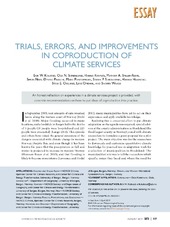| dc.contributor.author | Kolstad, Erik Wilhelm | |
| dc.contributor.author | Sofienlund, Oda Nærland | |
| dc.contributor.author | Kvamsås, Hanna | |
| dc.contributor.author | Stiller-Reeve, Mathew Alexander | |
| dc.contributor.author | Neby, Simon | |
| dc.contributor.author | Paasche, Øyvind | |
| dc.contributor.author | Pontoppidan, Marie Louise Nielsen | |
| dc.contributor.author | Sobolowski, Stefan Pieter | |
| dc.contributor.author | Haarstad, Håvard | |
| dc.contributor.author | Oseland, Stina Ellevseth | |
| dc.contributor.author | Omdahl, Lene | |
| dc.contributor.author | Waage, Snorre | |
| dc.date.accessioned | 2020-04-15T11:42:08Z | |
| dc.date.available | 2020-04-15T11:42:08Z | |
| dc.date.issued | 2019 | |
| dc.Published | Kolstad EW, Sofienlund, Kvamsås H, Stiller-Reeve MA, Neby S, Paasche Ø, Pontoppidan M, Sobolowski SP, Haarstad H, Oseland SE, Omdahl L, Waage S. Trials, errors and improvements in co-production of climate services. Bulletin of The American Meteorological Society - (BAMS). 2019;100(8):1419-1428 | eng |
| dc.identifier.issn | 0003-0007 | |
| dc.identifier.issn | 1520-0477 | |
| dc.identifier.uri | https://hdl.handle.net/1956/21868 | |
| dc.description.abstract | Climate change yields both challenges and opportunities. In both cases, costly adaptations and transformations are necessary and desirable, and these must be based on realistic and relevant climate information. However, it is often difficult for climate scientists to communicate this information to decision-makers and stakeholders, and it can be equally difficult for such actors to interpret and put the information to use. In this essay, we discuss experiences and present recommendations for scientists producing climate services. The basis is our work in several climate service projects. One of them aimed to provide local-scale climate data for municipalities in western Norway and to explore how the data were interpreted and implemented. The project was first based solely on climate science expertise, and the participants did not have sufficient competence on coproduction and knowledge about the regulatory and political landscape in which municipalities operate. Initially, we also subscribed to an outdated idea of climate services, where knowledge providers (climate scientists) “deliver” their information to knowledge users (e.g., municipal planners). Increasingly, as stressed in the literature on coproduction of knowledge, we learned that climate service should be an iterative process where actionable information is coproduced through two-way dialogue. On the basis of these and other lessons learned the hard way, we provide a set of concrete recommendations on how to embed the idea of coproduction from the preproposal stage to beyond the end of climate service projects. | en_US |
| dc.language.iso | eng | eng |
| dc.publisher | American Meteorological Society | eng |
| dc.title | Trials, errors and improvements in co-production of climate services | eng |
| dc.type | Peer reviewed | en_US |
| dc.type | Journal article | en_US |
| dc.date.updated | 2020-02-17T14:14:28Z | |
| dc.description.version | publishedVersion | |
| dc.rights.holder | Copyright 2019 American Meteorological Society | en_US |
| dc.identifier.doi | https://doi.org/10.1175/BAMS-D-18-0201.1 | |
| dc.identifier.cristin | 1694438 | |
| dc.source.journal | Bulletin of The American Meteorological Society - (BAMS) | |
| dc.relation.project | Regionalt Forskningsfond - Vestlandet: 245403 | |
| dc.relation.project | Regionalt Forskningsfond - Vestlandet: 260037 | |
| dc.relation.project | Regionalt Forskningsfond - Vestlandet: 269682 | |
